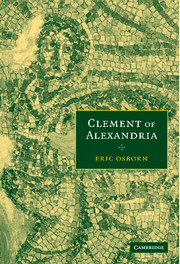Book contents
- Frontmatter
- Contents
- Preface
- List of abbreviations
- 1 Life and works
- PART I DIVINE PLAN/ECONOMY
- 2 Divine plan/economy and mobility
- 3 Scripture
- 4 Philo and Clement: from Divine Oracle to True Philosophy
- PART II DIVINE RECIPROCITY
- PART III FAITH AND SALVATION
- Conclusion
- Appendix: Irenaeus and Clement
- Select Bibliography
- Subject index
- Citations from Clement
- Citations from the Bible
- Citations from ancient authors
3 - Scripture
Published online by Cambridge University Press: 06 July 2010
- Frontmatter
- Contents
- Preface
- List of abbreviations
- 1 Life and works
- PART I DIVINE PLAN/ECONOMY
- 2 Divine plan/economy and mobility
- 3 Scripture
- 4 Philo and Clement: from Divine Oracle to True Philosophy
- PART II DIVINE RECIPROCITY
- PART III FAITH AND SALVATION
- Conclusion
- Appendix: Irenaeus and Clement
- Select Bibliography
- Subject index
- Citations from Clement
- Citations from the Bible
- Citations from ancient authors
Summary
FROM ECONOMY TO METAPHYSIC; FROM PROPHECY TO PLATO
The chief move in early Christian thought which joins Jerusalem and Athens together is not the introduction of multitudinous philosophical terms, but the movement from biblical text to metaphysic, or, to be more precise, from prophecy to Plato.
The plan of salvation is set out in the bible, which is prophetic. The prophets saw the noetic world, but spoke in metaphor and riddle. To reach the noetic world we must regard the text of the bible as metaphorical and with the help of Christ, who is not a metaphor, discern the noetic world where God's economy is seen.
Justin had already pointed to the superiority of the prophets over the philosophers. They had been able to see the noêta, while philosophers were still confused. Clement shows a process of reasoning which joins the bible with a Platonic metaphysic and dialectic. He has already indicated to the Greeks the exclusive excellence of prophecy as the way to piety and truth (prot 8.77).
The first step for anyone who wishes to expound the bible is to turn narrative and prophecy into parable and metaphysic. Irenaeus and others before him had given to the world of prophecy the same function (source of truth and knowledge) as the Platonic world of forms; Clement is the first to give a logical explanation of this fundamental move.
- Type
- Chapter
- Information
- Clement of Alexandria , pp. 56 - 80Publisher: Cambridge University PressPrint publication year: 2005



